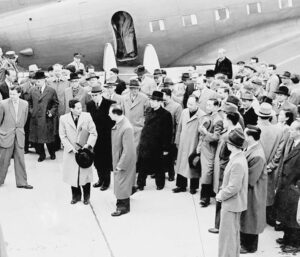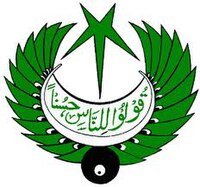In late 1953, amid tremendous shifts in the Indochinese battlefield, our Party and President Ho Chi Minh decided to wage a battle on the diplomatic front in conjunction with the 1953 – 1954 Winter – Spring Offensive to put an end to the war and restore peace in Vietnam and Indochina as a whole. In his interview with a Swedish reporter on 26 November 1953, President Ho Chi Minh stated that: “If the French Government has learnt a lesson from this years-long war, and wishes to cease hostilities in Vietnam through negotiations and settle the Vietnam issue in a peaceful manner, then the people and Government of the Democratic Republic of Vietnam stand ready to welcome such intention” and “the foundation for the cessation of hostilities in Vietnam is the French Government’s sincere respect for Vietnam’s true independence.
On 8 May 1954, exactly one day after the Dien Bien Phu victory that “echoed across five continents and shook the entire world”, the Geneva Conference began to discuss the restoration of peace in Indochina. After 75 days of complicated and intense negotiations with 31 sessions, the Geneva Agreements was signed on 21 July 1954. This, coupled with the Final Declaration on Restoring Peace in Indochina, affirmed the independence, sovereignty, unity, and territorial integrity of Vietnam, prevented the deployment of military officers and personnel to Vietnam, and determined the temporary nature of military borders as well as the need for an eventual free general election, among others.
In his rally following the successful Geneva Conference on 22 July 1954, President Ho Chi Minh announced that: “The Geneva Conference has concluded, and Vietnam’s diplomacy has achieved a great victory.” ² Indeed, while France only recognized Vietnam as a free state within the French Union in the 1946 Preliminary Agreement, with the Geneva Agreements, for the first time in the history of our country, Vietnam’s fundamental rights of a nation, including independence, sovereignty, unity, and territorial integrity, were officially affirmed in an international treaty, and recognized by countries at the Geneva Conference. This constituted an important political and legal basis for our people to continue the fight on political and diplomatic fronts, so as to subsequently liberate the South and reunite the country.
Together with the Dien Bien Phu victory, the signing of the Geneva Agreements led to the successful conclusion of the Vietnamese people’s resistance war against the French colonial empire, and put a decisive end to the reign of colonialism over Vietnam for nearly 100 years. The Agreements had thus paved the way for a new strategic phase for Vietnam’s revolution – the building of socialism in the North, and the pursuit of national and people’s democratic revolution in the South, with a view to truly achieving national independence and reunification.
Time-tested lessons
The negotiation, signing, and implementation of the Geneva Agreements can be considered an invaluable guidebook for Vietnam’s diplomatic style, with
a myriad of lessons regarding the distinctive principles, methods, and arts of the Ho Chi Minh diplomacy. And such lessons still hold true to this very day. The first lesson is the unflagging need to uphold independence and self-reliance on the basis of national interests. The negotiation and signing of the Geneva Agreements provide us with a better insight into the values of independence and self-reliance when it comes to international issues. As all countries act to further their own gains, only through the steadfast pursuit of independence and self-reliance can we manage to remain proactive and best ensure our national interests.
The second lesson is to utilize the combined strength of the nation and the times, and of national and international unity to create “an unparalleled might.” Apart from harnessing our country’s righteous cause and great national unity, our Party made the accurate decision to further bolster Vietnam’s solidarity with the world, starting with Laos, Cambodia, socialist states, international friends, and the peace-loving people around the globe.
The third lesson is to be unwavering in objectives and principles, and responsive in strategies, true to the principle of “to be firm in principles but flexible in their applications”. President Ho Chi Minh stated that “our unflagging goal is still peace, reunification, independence, and democracy. Our principle shall remain firm, and our actions flexible.” ³ In the negotiation and implementation of the Geneva Agreements, Vietnam’s “unwavering” basis was independence, reunification, and territorial integrity. These factors were consistently upheld all the way until the Paris Agreements later in 1973. And when Vietnam had not managed to fully achieve its ultimate goal, “flexibility” in its strategies was necessary in the path to eventually fulfil its unchanging objectives. Such was the art of the Ho Chi Minh diplomacy that was creatively built upon and further developed in Vietnam’s subsequent reform and international integration efforts. In addition, such measures representing the nature of “Vietnamese bamboo tree” in our country’s revolutionary diplomacy, with a “strong root”, “sturdy trunk”, and “flexible branches.”








